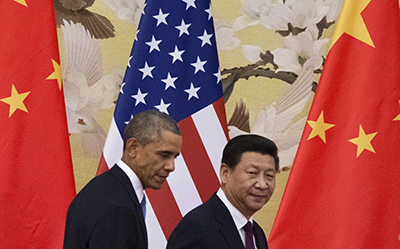Chinese President Xi Jinping issued tough words on the visa woes of international media outlets today, arguing that journalists facing visa restrictions had brought trouble on themselves and signaling that there will be little respite for the international media in China.
His remarks were in response to a question from New York Times White House correspondent Mark Landler, who asked during a Beijing press conference–at which Xi and President Barack Obama announced a landmark climate change deal–whether China would ease visa restrictions on international correspondents in light of a broader visa agreement with the U.S.
Currently, reporters from The New York Times, Bloomberg, Reuters, and Al-Jazeera are among those who have been denied visas to China, according to reports. Earlier this year, Chinese authorities refused to renew a visa for New York Times reporter Austin Ramzy, forcing him to cover China from outside the country.
In the weeks leading up to the press conference White House officials pressed their Chinese counterparts to allow questions from reporters, The Associated Press reported. It is rare in China for journalists to be permitted to ask questions at joint press conferences with foreign leaders, and the government agreed just hours before the event to allow one reporter from each country to raise a question, according to reports.
Before responding to Landler, Xi took a question from the Chinese press. He then compared the visa troubles of international journalists to a car that has broken down. “When a car breaks down on the road, perhaps we need to step down and see what the problem is,” he said through a translator. “When a certain issue is raised as a problem, there must a reason,” Xi added, according to reports.
In remarks that were not translated into English at the press conference, Xi added that, “The Chinese say, ‘Let he who tied the bell on the tiger take it off'” — a saying that can also be translated as, “The one who created the problem should be the one who solves it,” The New York Times reported.
The “bell” he referred to is journalism of the kind we and other good news organizations do everywhere else.
— Joe Kahn (@nycscribe) November 12, 2014
The Committee to Protect Journalists has frequently documented the challenges experienced by the foreign press, including instances where international journalists have been subjected to “visa purgatory.” After The New York Times reported on the finances of the family of former premier Wen Jiabao, authorities blocked the newspaper’s Chinese-language website. It remains blocked, and the paper’s English-language site is also inaccessible in the mainland, along with those of Bloomberg and The Guardian, according to media reports.
In the past year, CPJ has also documented a series of directives issued by the government barring Chinese journalists from cooperating with foreign news agencies.
But Xi’s words provide a rare firsthand glimpse into China’s tough approach in dealing with foreign media who report on sensitive matters–an approach that seems unlikely to change anytime soon. It’s apparent that Xi is familiar with visa restrictions, but he’s going so far as to say that journalists and media organizations are to blame for their troubles.
China may have taken a step forward in addressing climate change, but when it comes to press freedom its words and actions show it still has a long way to go.
